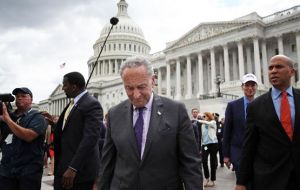MercoPress. South Atlantic News Agency
US Congress begins work on major tax reform compromise bill
 “People wanting to keep more of their hard-earned money. That's what you see in the bills,” said Senator John Barrasso, chair of the Republican Policy Committee
“People wanting to keep more of their hard-earned money. That's what you see in the bills,” said Senator John Barrasso, chair of the Republican Policy Committee  The Senate bill cuts individual taxes only through 2025, and repeals the requirement that Americans must buy health insurance under ObamaCare.
The Senate bill cuts individual taxes only through 2025, and repeals the requirement that Americans must buy health insurance under ObamaCare.  The US Congress has not passed major tax reform in roughly three decades, and Trump is eager and equally optimistic about success.
The US Congress has not passed major tax reform in roughly three decades, and Trump is eager and equally optimistic about success.  “A step closer to delivering MASSIVE tax cuts for working families across America, Look forward to signing a final bill before Christmas!” twitted Trump
“A step closer to delivering MASSIVE tax cuts for working families across America, Look forward to signing a final bill before Christmas!” twitted Trump United States House and Senate lawmakers return to Capitol Hill on Monday to begin working on a major tax cut compromise bill -- just two days after GOP senators narrowly approved their chamber’s plan on a 51-to-49 vote. The House, which has a larger Republican majority, approved its version last month.
“People wanting to keep more of their hard-earned money. That's what you see in the bills,” said Senator John Barrasso, chairman of the Republican Policy Committee, amid the large focus on the bills’ differences. “Absolutely there are some changes that still need to be made in conference to work these things out.”
Among the big differences: The Senate bill cuts individual taxes only through 2025, and repeals the requirement, or mandate, that Americans must buy health insurance under ObamaCare.
However, the separate bills each reduce the corporate tax rate from 35% to 20% and eliminate state and local tax deductions while doubling the standard deduction for individual filers.
“Members from the House and the Senate will get together to look for the best solutions,” Barrasso also said.
He struck an upbeat tone, compared to what fellow GOP senators were saying after they failed this summer to repeal and replace ObamaCare -- hurting their chances of keeping control of Congress in next year’s congressional elections and denying Trump his first, major legislative victory.
Congress has not passed major tax reform in roughly three decades, and Trump is eager and equally optimistic about success.
“We are one step closer to delivering MASSIVE tax cuts for working families across America. Special thanks to @SenateMajLdr Mitch McConnell and Chairman @SenOrrinHatch for shepherding our bill through the Senate. Look forward to signing a final bill before Christmas!” the president tweeted hours after the Senate passed its bill at about 2 a.m. Saturday.
Also on Sunday, Senate Majority Leader Mitch McConnell sounded confident that Congress will get enough bipartisan support to pass a temporary spending bill before the federal government runs out of money on Friday, amid concerns that Democrats will withhold votes unless the measure included a fix to the expiring immigration program known as the Deferred Action for Childhood Arrivals, or DACA.
“There’s not going to be a government shutdown. It’s just not going to happen,” the Kentucky Republican said on ABC’s “This Week,” while also pointing out that Trump has given Congress until March to make the fix.
“I don’t think the Democrats would be very smart to say, ‘We want to shut down the government over a non-emergency that we can address any time between now and March,' ”McConnell also said.
Republican congressional leaders received a good signal on Saturday that House conservatives, who frequently oppose leadership-driven measures, appear ready to vote yes on a final tax deal.
”Now comes the final step,” said North Carolina GOP Rep. Mark Meadows, chairman of the conservative House Freedom Caucus. “Now is the moment in which both chambers must come together, work out our differences, and finish what we’ve begun.”
Still, Maine GOP Sen. Susan Collins, known to put the concerns of home state voters ahead of Senate leadership’s, suggested her final vote will depend on what the so-called House and Senate “conferees” decide.rrasso




Top Comments
Disclaimer & comment rulesCommenting for this story is now closed.
If you have a Facebook account, become a fan and comment on our Facebook Page!